#climatechangeawareness
Explore tagged Tumblr posts
Text
Welcome to Clean Earth Fun Facts: Where Gaming Meets Green Living!
🌍 Welcome to Clean Earth Fun Facts, your ultimate destination for the most entertaining and enlightening facts about our planet and how to keep it clean and green! 🌱 Our mission is to spread awareness about environmental issues and inspire action towards a sustainable future. Join us in this journey to learn, laugh, and make a difference! 🌍
Why Gaming?
Gaming isn't just about fun and adventure—it's also a powerful tool for education and awareness. As an avid gamer myself, I've discovered a wealth of video games that are not only entertaining but also promote environmental consciousness. Through immersive gameplay, these games teach us about the importance of conservation, renewable energy, and sustainable living. Here, we blend our love for gaming with our passion for a greener planet, showing you how to enjoy your favorite pastime while making a positive impact on the world.
Featured Green Games
1. ECO:
In this multiplayer simulation game, players work together to build a civilization while balancing their impact on the environment. It’s a perfect example of how collective action and sustainable practices can lead to a thriving, balanced ecosystem.
2. Beyond Blue:
Dive into the ocean and explore the mysteries of marine life. This game emphasizes the beauty and fragility of our oceans, educating players about marine biology and the impact of human activities on underwater ecosystems.
3. Alba: A Wildlife Adventure:
Follow the story of a young girl on a mission to save her island and its wildlife. Through her journey, players learn about wildlife conservation and the importance of protecting natural habitats.
4. Terra Nil:
A reverse city-builder game where you restore a barren wasteland into a thriving ecosystem. This game beautifully illustrates the concepts of rewilding and ecological restoration.
Fun Environmental Facts
Renewable Energy is on the Rise: Did you know that solar power is now the cheapest source of electricity in history? The shift towards renewable energy is gaining momentum globally, paving the way for a cleaner, greener future.
The Ocean’s Role in Climate Regulation: Oceans absorb about 30% of the carbon dioxide produced by humans. Protecting marine environments is crucial in the fight against climate change.
Plastic Pollution: Every year, about 8 million tons of plastic end up in our oceans. Small changes in our daily habits, like using reusable bags and bottles, can significantly reduce plastic waste.
Tree Planting: A single mature tree can absorb up to 48 pounds of carbon dioxide per year. Planting trees is one of the simplest and most effective ways to combat climate change.
How You Can Make a Difference
Reduce, Reuse, Recycle: Follow the three Rs to minimize waste and reduce your environmental footprint.
Support Sustainable Brands: Choose products from companies that prioritize sustainability and eco-friendly practices.
Educate Yourself and Others: Stay informed about environmental issues and share your knowledge with friends and family.
Get Involved: Participate in local clean-up events, tree planting activities, and other environmental initiatives.
Join the Movement
At Clean Earth Fun Facts, we believe that knowledge is power, and by combining fun, facts, and gaming, we can inspire real change. Follow us for regular updates, game reviews, and tips on how to live a more sustainable life. Together, we can make a difference—one fun fact and one game at a time.
🌍 Stay Green, Keep Gaming, and Spread the Word! 🌍
#CleanEarth #GreenPlanet #FunFacts #EnvironmentalAwareness #SustainableLiving #EcoFriendlyTips #Conservation #ClimateChange #EarthDay #RenewableEnergy #CleanEarthFunFacts
#GreenPlanetEntertainment #EcoFriendlyFacts #ConservationEducation #ClimateChangeAwareness #EarthDayCelebrations #RenewableEnergySolutions #EntertainingFactsAboutTheEnvironment
Welcome to Clean Earth Fun Facts, your ultimate source for entertaining and educational content about the environment, sustainable living, and renewable energy solutions. Join us as we explore fascinating facts, tips, and celebrations related to a clean and green planet.
🌍 Environmental Awareness Videos: Dive into our collection of thought-provoking videos that raise awareness about the importance of preserving our planet and inspire positive change.
🌱 Sustainable Living Tips: Learn practical ways to incorporate eco-friendly practices into your daily life. Discover simple yet effective strategies for reducing waste, conserving resources, and embracing a sustainable lifestyle.
💚 Eco Friendly Facts: Uncover interesting and surprising facts about the environment, from unique ecosystems and endangered species to innovative eco-friendly technologies and initiatives.
🌿 Conservation Education: Gain a deeper understanding of conservation efforts worldwide. Explore the challenges faced by different ecosystems and learn about the initiatives and projects aimed at protecting our planet's biodiversity.
🌎 Climate Change Awareness: Stay informed about the latest developments in climate change research and solutions. Discover how individuals, communities, and organizations are working together to combat this global challenge.
🎉 Earth Day Celebrations: Join us in celebrating Earth Day and learn about the history, significance, and various events held around the world. Get inspired to take part in activities that promote environmental consciousness.
☀️ Renewable Energy Solutions: Explore the exciting world of renewable energy and sustainable technologies. Learn about solar power, wind energy, and other innovative solutions that can help us transition to a greener future.
Sit back, relax, and let us entertain and educate you with fascinating facts and inspiring stories about our incredible planet. Don't forget to subscribe to our channel and hit the notification bell to stay updated on our latest videos. Together, let's make a difference and create a cleaner, greener world!
🌍 Welcome to Clean Earth Fun Facts, where we bring you the most fun and entertaining facts about our planet and how to keep it clean and green! 🌱 Our goal is to spread awareness about environmental issues and inspire people to take action towards a sustainable future. 🌍 Join us on this journey to learn, laugh and make a difference! 🌍
I am an environmental enthusiast. I have a passion for creating a cleaner and greener environment, and I believe that we can make a significant impact with your help. As an advocate for a more sustainable future, I have created the "Go Green Clean Environment Initiative" to support our community's transition to a more eco-friendly lifestyle.
With your support, we can make a positive impact on the environment and reduce our carbon footprint. Our goal is to make our community a model of sustainability for others to follow.
I have created a Clean Earth Fun Facts Website where I share my knowledge and experiences with others, helping them understand the importance of a sustainable future. I also have a LinkedIn Profile where I discuss environmentally friendly investments and ways to make a difference through conscious investing.
Your contribution will help us further Clean Earth Fun Facts content creation. We believe that every little bit counts, and we appreciate any donation, no matter the size.
Together, we can make a difference and create a cleaner and greener future for our community and the world. Thank you for your support!
Welcome to Clean Earth Fun Facts, your ultimate destination for all things green, sustainable, and eco-friendly! Join us as we explore environmental awareness, conservation, renewable energy, and more. Our channel promotes green living, sustainable practices, and the importance of biodiversity. Dive into a world of eco-consciousness and discover green initiatives, reduce your carbon footprint, and become an eco-warrior. Learn about sustainable fashion, wildlife conservation, and the latest green technologies. Let's make a positive environmental impact through education and advocacy. Together, we can create a cleaner, greener future for our planet. Subscribe now and join the Clean Earth Fun Facts community!
🌍 Thank you for your interaction and support! I'm thrilled to have you here in the Clean Earth Fun Facts community. Together, we're making a positive impact on our planet with every step we take towards a greener future. 🌿✨
If you're looking for captivating videos on environmental awareness, sustainable living tips, and entertaining facts about the environment, you've come to the right place! 🎥🌱 Join me on https://michaelanthonyhoga6.wixsite.com/youtubecomcleanearth for an engaging journey towards a cleaner, greener planet.
Let's spread the word about the importance of conservation, climate change awareness, and the wonders of renewable energy solutions. Together, we can make Earth Day celebrations a year-round event!
Remember, every small action counts. Share the knowledge, embrace eco-friendly practices, and let's create a brighter future for generations to come. 🌎💚
Join the Clean Earth Fun Facts movement and be part of the solution for a cleaner, greener, and more sustainable planet! Our website is a hub of valuable information and resources dedicated to spreading awareness about environmental issues and promoting sustainable living practices. We provide engaging content, including informative articles, entertaining videos, and interactive quizzes, all aimed at educating and inspiring individuals to make a positive impact on our planet. If you are an advertiser who shares our vision for a better world, we invite you. By placing your brand on our platform, you can reach a passionate and environmentally-conscious audience eager to support businesses that align with their values. Leave your information below, and our team will get in touch with you to discuss exciting advertising opportunities. Together, let's create a sustainable future and make a real difference for generations to come.
Sign up for Robinhood with my link and we'll both pick our own gift stock 🎁 https://join.robinhood.com/michaeh5021
AiTubo
https://aitubo.ai/?ref=ngy4mgm
YouTube:
youtube.com/@CleanEarthFunFacts
LinkedIn: linkedin.com/comm/mynetwork/discovery-see-all?usecase=PEOPLE_FOLLOWS&followMember=michael-hogan-597090166
Reddit: reddit.com/r/CleanEarthFunFacts/
Website: michaelanthonyhoga6.wixsite.com/youtubecomcleanearth
Tumblr: cleanearthfunfacts.tumblr.com
Pinterest: pinterest.com/pin/create/button/?url=https%3A%2F%2Ftmblr.co%2FZOzz2sdpv2698e00
Facebook: Facebook.com/@CleanEarthFunFacts
Instagram: Instagram.com/CleanEarthFunFacts/
TikTok:
TikTok.com/@CleanEarthFunFacts
Twitter:
https://twitter.com/cleanearthff
Discord:
https://discord.com/invite/UY5Fcxdj
WhatsApp:
https://wa.me/c/17864775928
Steam:
https://steamcommunity.com/profiles/76561199580103334/
VidiQ:
https://Vidiq.com/CleanEarthFunFct
Twitch:
https://dashboard.twitch.tv/u/cleanearthfunfacts
Support the Channel:
Donate:
Paypal.me/CleanEarthFunFacts
Donate:
https://www.paypal.com/donate/?business=YGBDYXSCUYPGL&no_recurring=0&item_name=%F0%9F%8C%8D+Clean+Earth+Fun+Facts%2C+the+most+fun+and+entertaining+facts+about+our+planet+and+how+to+keep+it+clean+and+green%21+%F0%9F%8C%B1%F0%9F%8C%8D%0A¤cy_code=USD
Crypto Donations: https://commerce.coinbase.com/charges/2W2TW79B
CashApp:
https://cash.app/app/ZPCHTV9
Stay tuned for entertaining facts about the environment, Earth Day celebrations, renewable energy solutions, and more!
#environmentalawareness#sustainableliving#climatechange#renewableenergy#ecofriendlyfacts#earthday#funfacts#cleanearth#greenplanet#gamerguy#gamergirl#gamer#video games#gaming#gamification#video game#virtual reality#virtual youtuber#virtual photography#vr#EcoFriendlyTips#Conservation#CleanEarthFunFacts#GreenPlanetEntertainment#ConservationEducation#ClimateChangeAwareness#EarthDayCelebrations#RenewableEnergySolutions#EntertainingFactsAboutTheEnvironment
3 notes
·
View notes
Text

Centro Histórico de Porto Alegre, 04/05/2024.
#flood#container#phonebooth#orelhão#climatechange#climatechangeisreal#climatechangeawareness#centrohistorico#portoalegre#brasil#pentax#pentaxkr#pentaxda35mmf24
4 notes
·
View notes
Text
The Dark Side of Dairy: How Cows Are Exploited and Milked Dry
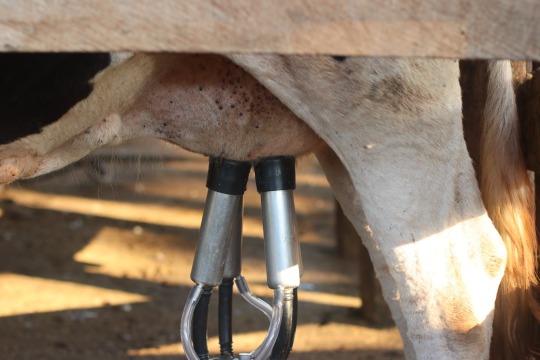
Introduction:
Globally, the demand for dairy products seems insatiable. From cheese to yogurt, milk forms an integral part of our diets and cultural practices. However, behind this seemingly innocent staple lies a dark reality of animal cruelty and exploitation. In this blog post, we will uncover the hidden side of dairy production and explore alternative choices that promote compassion and respect for all beings.
The Dairy Industry: A Snapshot:
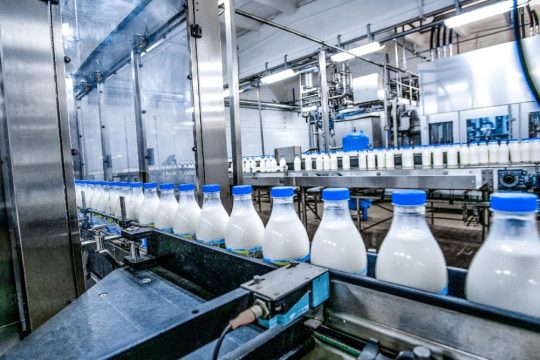
The dairy industry operates on an enormous scale, supplying our growing population with an abundance of milk and its varied derivatives. It's not just about satisfying our dietary needs; it's a multi-billion dollar industry that fuels economies and feeds traditional dietary habits. Despite its significance, we must examine the practices within this industry and question the ethical implications.
The Livestock Paradox: Deconstructing the Dairy Cow:
Dairy cows are at the heart of the industry, yet their living conditions and treatment often go unnoticed. These bovine creatures are subjected to high-intensity milk production, placing tremendous strain on their physical and emotional well-being. The constant milking can lead to painful udder infections, lameness, and a shortened lifespan.
Another distressing aspect of the dairy industry is the separation of mother cows from their calves. This separation causes immense emotional distress for both parties, as the natural and deep bond between a mother and her calf is abruptly severed. These calves are often sent to veal operations, while the mother cows are impregnated again to maintain milk production.
Factory Farms: Behind the Scenes of Dairy Production:
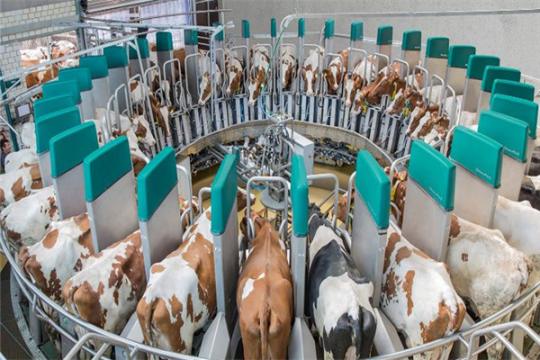
The reality of modern dairy production lies in factory farms, where cows are treated as commodities rather than sentient beings. These farms prioritize maximum milk output, often at the expense of cow welfare. Forced pregnancies through artificial insemination are common practice, further exploiting these gentle animals.
Within factory farms, dehorning and tail docking are routinely carried out. These painful practices are done without anesthesia or pain relief, causing immense suffering to innocent animals. The cramped, unsanitary living conditions in which cows are often confined are detrimental to their health, leading to various diseases and infections.
Alternatives to Traditional Dairy:
Thankfully, compassionate options exist for those wanting to steer clear of traditional dairy. Plant-based milk alternatives have gained significant popularity in recent years, offering a wide range of choices like almond, soy, oat, and coconut milk. These alternatives not only provide vital nutrients but are also kinder to animals and the environment.
Non-dairy options are no longer considered a niche product; they can be found in mainstream supermarkets and coffee shops. The shift towards plant-based milks highlights a growing awareness of ethical consumerism and a desire to make choices aligned with compassion and sustainability.
Animal Welfare in Dairy: Industry Reforms and Public Awareness:
Recognizing the need for change, legislation and regulations have been implemented to improve animal welfare standards in the dairy industry. These reforms aim to address key issues such as space requirements, humane treatment, and access to outdoor areas. Additionally, animal rights organizations play a crucial role in advocating for the fair treatment of cows, pushing for stricter regulations and promoting ethical farming practices.
However, change doesn't rest solely on legislative measures. Public awareness and education are essential components in driving industry-wide reform. By sharing the truth about the dark side of dairy, we can inspire more individuals to make compassionate choices and support farms that prioritize the well-being of animals.
Making Compassionate Choices: Tips for Consumers:
As consumers, we hold the power to drive change through the choices we make. Here are some practical steps you can take to reduce your reliance on traditional dairy and support ethical alternatives:
Try different plant-based milks and explore the variety available to find your favorite.
Experiment with dairy-free recipes and discover new ways to incorporate non-dairy options into your meals.
Support local, ethical dairy farms that prioritize the health and welfare of their cows.
Spread awareness by sharing the realities of dairy production with friends, family, and colleagues.
Consider reducing overall dairy consumption, even if you're not ready to go completely dairy-free.
Conclusion:
The dairy industry might seem like an integral part of our lives, but it's crucial to understand the cruelty behind its production. By choosing alternative options such as plant-based milks, we can support businesses that prioritize the well-being of cows and help create a future where compassion and respect are at the forefront. Together, let's challenge our dietary habits and work towards a world where no living being is milked dry for our pleasure.
#animal rights#go vegan#veganlife#animal cruelty#animal welfare#factory farming#animals#climatechangeawareness
5 notes
·
View notes
Text

https://www.teepublic.com/t-shirt/58709849-bike-for-change-one-planet-two-wheels?store_id=2712644
My Redbubble store
https://redbubble.com/people/Rajasekar/shop?asc=u&ref=account-nav-dropdown…
My Teepublic store
https://teepublic.com/user/freshstyle
#redbubble#teepublic#redbubbleartist#redbubblesticker#climatechange#climateawareness#climatechangeawareness#TeePublic#tshirt
2 notes
·
View notes
Text
Global Warming Saves Lives Shirt
Stand Out in Style – Global Warming Saves Lives Shirt
Make a bold statement with the Global Warming Saves Lives Shirt. Designed for individuals who value wit, irony, and awareness, this shirt blends humor with a touch of environmental consciousness. Its sleek design and powerful message make it a conversation piece you’ll love wearing.
Store here: https://www.usatrendyshirt.com/global-warming-saves-lives-shirt
Features:
High-quality cotton for maximum comfort.
Durable print with an eye-catching slogan.
Unisex fit, suitable for all.
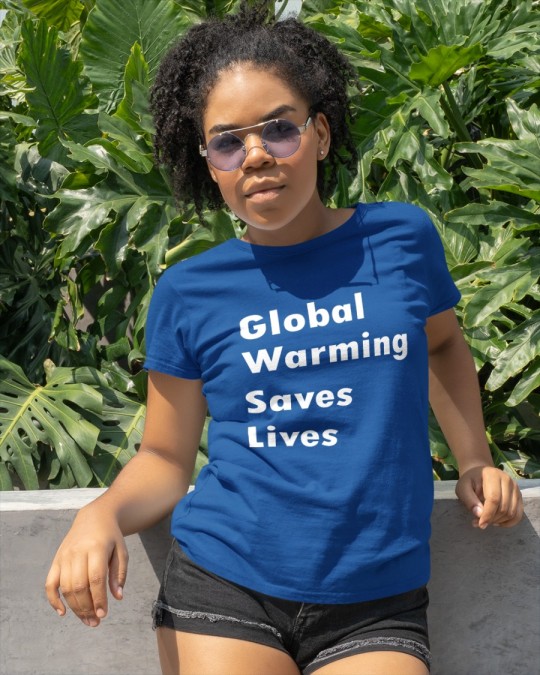
Perfect for casual outings, events, or as a gift for someone with a great sense of humor and style.
#GlobalWarmingSavesLives#SustainableFashion#EcoFriendlyApparel#ClimateChangeAwareness#EthicalClothing#GoGreenStyle#ConsciousFashion#PlanetFriendlyThreads#BoldStatements#WearYourValues
0 notes
Photo

Dangerous weather may unfold in the Plains today. Severe storms may bring tornados, damaging winds and hail. Record warm will feed the storms that may impact Kansas City and Wichita. Snow will also hit Wyoming today. Some areas will see over 6 inches of snow.
#SevereWeather#TornadoWatch#StormAlert#PlainsWeather#HailStorm#KansasCityWeather#WichitaWeather#RecordWarmth#WinterStorm#SnowAccumulation#EmergencyPreparedness#WeatherWarnings#SevereThunderstorms#ExtremeWeather#MeteorologyNews#WeatherUpdate#WyomingSnow#DangerousConditions#ImpactfulWeather#Nature#StaySafe#PlanAhead#WeatherForecast#ClimateChangeAwareness#SevereStorms2023#WeatherPreparedness#SnowForecast#TornadoSeason#SevereWeatherSafety#NationalWeatherService
0 notes
Text
youtube
Climate Change Explained: News, Solutions, and Impact in 2024
In this video, we explore the latest updates and news on climate change in 2024 and break down complex environmental topics for viewers of all ages. Learn about the causes, effects, and solutions to climate change through engaging explanations and thought-provoking examples. Whether you're looking for a short film about climate change, a fun song for kids, or insights from a documentary or debate, we’ve got it all covered. This video is perfect for students writing climate change paragraphs for school, HSC assignments, or anyone curious about the global response to this pressing issue. We’ll also dive into unique content, such as climate change through the lens of art with mentions of Skee Mask, and environmental activism in music with artists like Gawvi. Whether you're looking for solutions, facts, or explanations, our content will keep you informed and entertained. Stay tuned for more in-depth discussions, educational videos, and media recommendations on climate change—the defining challenge of our time! -----------
#climatechange#change#climate#globalwarming#climatechangeawareness#global#changes#climatechangeisreal#airpollution#withoutnaturedarkfuture#environment#theultimaterenewable#sustainableimpact#weather#pollution#savetheplanet#greennewdeal#sustainable#sustainability#makeadifference#socialgood#energysaving#ourplanetdaily#socialwork#Youtube
0 notes
Text
#tuesdaymotivation#motivationtuesday#climatechangeawareness#climatechangeisreal#globalwarming#climatechange#climate#savetheplanet#sustainability#energysaving
0 notes
Text
#Indonesia#ClimateChange#Flooding#ClimateChange2024#FloodDamage#ClimateChangeImpact#IndonesiaFlood#ClimateAction#ExtremeWeather#ClimateChangeFlood#ClimateChangeIndonesia#GlobalWarming#ClimateCrisis#ClimateChangeEffects#EnvironmentalImpact#FloodRescue#FloodMitigation#ClimateChangeAwareness#ClimateChangeResponse#ClimateChangeChallenge
1 note
·
View note
Text
This Farming Practice Can Capture 2 BILLION TONNES of Carbon
youtube
Discover the potential transformative power of rock dust, where we delve into innovative climate solutions right beneath our feet. Rock dust, a natural byproduct from the mining and construction industries, is gaining traction for its carbon capture capabilities, offering a promising avenue for reducing atmospheric CO2. In this episode, we're exploring how applying crushed basalt to our farmlands can not only help sequester billions of tones of carbon dioxide but also revitalize soil health and increase crop yields. This sustainable practice, rooted in the essence of the Earth's own processes, is already making strides in the agricultural community. Join me as we investigate the potential of enhanced weathering with rock dust to create more resilient and eco-friendly farming systems. We'll examine the current research, and the long-term impact on our environment. If you're interested in how cutting-edge environmental science and practical farming can join forces to tackle climate change, you won't want to miss this. Make sure to like, subscribe, and comment with your thoughts on this potentially groundbreaking approach to sustainable agriculture. Stay tuned for more stories about conservation and the environment, and let's work together to nurture the land that feeds us and fight climate change, one farm at a time
#conservationvlogs#biodiversityexplorations#climatechangeawareness#studentsurvivaltips#natureadventures#environmentaleducation#wildlifeencounters#Youtube
1 note
·
View note
Text

Praia do Encontro. São Jerônimo, 21/07/2024.
#tree#hanginclothes#praiadoencontro#saojeronimo#brasil#flood#climatechange#climatechangeisreal#climatechangeawareness#debris#fujifilm#fujifilmxseries#fujifilmxt30ii
1 note
·
View note
Text
Why We Need to Address Animal Cruelty in Factory Farms Now

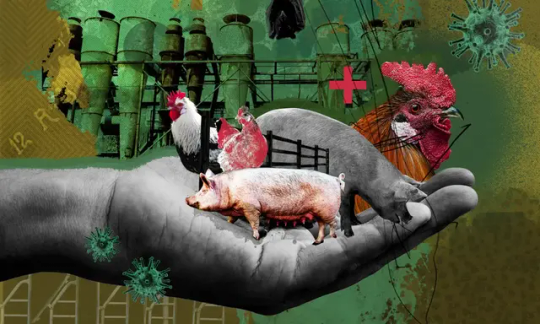
Animal cruelty in factory farms is a prevalent issue that has been gaining more attention in recent years. These farms, also known as concentrated animal feeding operations, are responsible for producing the majority of meat, dairy, and eggs for human consumption. However, the methods used in these facilities often lead to inhumane and unethical treatment of animals. The living conditions, handling procedures, and slaughter processes in factory farms have been exposed as brutal and inhumane, causing immense suffering to millions of animals every day. Despite the growing public concern and outrage, the practice of animal cruelty in factory farms continues to persist. This raises the question - why is it essential to address this issue now? This article will explore the reasons why we need to take immediate action to address animal cruelty in factory farms and the impact it has on animal welfare, human health, and the environment. Through a professional and evidence-based approach, we will delve into the urgency of this matter and the steps that need to be taken to bring about change.
Inhumane conditions for factory farmed animals
Factory farming is an industry that has been under scrutiny due to the inhumane conditions in which animals are raised. These animals are often confined to small, overcrowded spaces, unable to move freely or engage in natural behaviors. They are subjected to stressful and unsanitary environments, leading to immense physical and psychological suffering. Practices such as dehorning, debeaking, and tail docking are routinely used without proper anesthesia or pain relief, causing unnecessary pain and distress. Additionally, the use of growth hormones and antibiotics to maximize production further compromises the welfare of these animals. It is imperative that we address these cruel conditions in factory farms and work towards implementing more humane and sustainable practices to ensure the well-being of these sentient beings.
Impact on public health concerns
The impact of animal cruelty in factory farms extends beyond the realm of animal welfare and raises significant public health concerns. In these facilities, the close proximity and unsanitary conditions provide a breeding ground for the spread of diseases. The cramped living spaces and stress experienced by animals weaken their immune systems, making them more susceptible to infections. The use of antibiotics to combat these infections further contributes to the rise of antibiotic-resistant bacteria, posing a serious threat to human health. Moreover, the consumption of meat from animals raised in such conditions increases the risk of foodborne illnesses, including salmonella and E. coli. Addressing animal cruelty in factory farms is not only a moral imperative but also a necessary step in safeguarding public health.
Ethical responsibility in food production
When discussing ethical responsibility in food production, it is crucial to consider not only the treatment of animals but also the impact on the environment and the welfare of communities. The choices we make as consumers and producers have far-reaching consequences that extend beyond our immediate surroundings. Sustainable farming practices, such as organic farming and regenerative agriculture, prioritize the health and well-being of animals, promote biodiversity, and minimize the use of harmful chemicals. Additionally, supporting local and small-scale farmers not only ensures the humane treatment of animals but also strengthens local economies and fosters a sense of community. By embracing ethical responsibility in food production, we can create a more sustainable and equitable future for both animals and humans.
Violations of animal welfare laws

Instances of violations of animal welfare laws in factory farms are a significant concern that cannot be overlooked. These violations often involve the mistreatment and neglect of animals, resulting in unnecessary suffering and compromised well-being. Such practices not only contradict the principles of ethical farming but also reflect a disregard for the basic rights and dignity of sentient beings. Animals raised in factory farms are often subjected to overcrowded and unsanitary conditions, deprived of natural behaviors, and subjected to painful procedures without adequate pain relief. These violations highlight the urgent need for stricter regulation and enforcement to ensure the protection of animal welfare in factory farming operations. By addressing these violations and promoting stronger animal welfare standards, we can work towards a more compassionate and responsible approach to food production.
Environmental consequences of factory farming
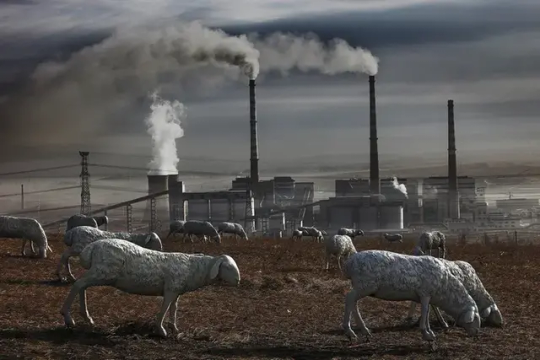
Factory farming also has significant environmental consequences that cannot be ignored. The intensive production practices employed in these operations result in a range of detrimental effects on the environment. One of the most prominent concerns is pollution. Factory farms generate vast amounts of animal waste, which often ends up in nearby water bodies, contaminating them with excessive levels of nutrients and harmful bacteria. This pollution can lead to eutrophication, causing the depletion of oxygen levels in water and harming aquatic life. Additionally, the release of greenhouse gases, such as methane and nitrous oxide, from the decomposition of animal waste and the use of chemical fertilizers contribute to climate change and air pollution. The overuse of antibiotics in factory farming also poses a threat by promoting antibiotic resistance, which can have far-reaching consequences for human and animal health. It is essential that we address these environmental repercussions and promote sustainable and eco-friendly alternatives to factory farming to safeguard our planet's well-being for future generations.
Connection to antibiotic resistance
The overuse and misuse of antibiotics in factory farming practices have direct implications for the issue of antibiotic resistance. Antibiotics are routinely administered to animals in factory farms to promote growth and prevent diseases that can spread easily in overcrowded and unsanitary conditions. However, this widespread use of antibiotics creates a breeding ground for antibiotic-resistant bacteria to emerge and spread. These resistant bacteria can then enter the food chain and potentially infect humans through the consumption of contaminated meat and animal products.
The connection between animal agriculture and antibiotic resistance is a significant concern for public health. When antibiotics are used extensively in animals, bacteria that are exposed to these drugs can develop mechanisms to survive their effects. These resistant bacteria can then be transferred to humans through various pathways, including direct contact with animals, consumption of contaminated food, or exposure to contaminated environments. As a result, common infections that were once easily treatable with antibiotics may become more difficult, or even impossible, to cure.
Addressing antibiotic resistance in factory farms is crucial to safeguarding public health. Implementing stricter regulations on the use of antibiotics in animal agriculture, promoting responsible and judicious use of these drugs, and improving animal welfare conditions can help mitigate the development and spread of antibiotic-resistant bacteria. Furthermore, promoting sustainable farming practices that prioritize animal health and reduce the reliance on antibiotics can contribute to a healthier and more resilient food system for both humans and animals.
In conclusion, the connection between factory farming and antibiotic resistance is a pressing issue that requires immediate attention. By addressing the overuse of antibiotics in animal agriculture, we can protect public health, preserve the effectiveness of these life-saving drugs, and promote a more sustainable and ethical approach to food production.
Potential for disease outbreaks

The conditions present in factory farms, such as overcrowding, poor sanitation, and stressed animals, create an environment that is ripe for the outbreak and spread of diseases. Animals living in such close quarters are highly susceptible to infections, which can easily transmit from one animal to another. Additionally, the stress and weakened immune systems of these animals make them more vulnerable to diseases and make it harder for them to fight off infections. If left unchecked, these diseases can quickly escalate and have the potential to spread beyond the confines of the factory farm, posing a significant risk to public health. It is crucial that we address the issue of animal cruelty in factory farms to mitigate the potential for disease outbreaks and protect both animal welfare and human health.
Lack of transparency in industry
The lack of transparency in the factory farming industry is a concerning issue that needs to be addressed urgently. Transparency plays a crucial role in ensuring accountability, ethical practices, and public trust in any industry. However, the factory farming industry has been notorious for its lack of transparency, with many operations operating behind closed doors and shielding their practices from public scrutiny. This lack of transparency not only hinders consumers' ability to make informed choices about the products they purchase but also raises concerns about animal welfare, environmental impact, and the overall sustainability of the industry. It is essential that we advocate for greater transparency in the factory farming industry, encouraging companies to disclose their practices, provide access to their facilities, and engage in open dialogue with consumers and advocacy groups. By promoting transparency, we can foster a more responsible and ethical industry that aligns with our values and promotes the well-being of animals, the environment, and public health.
Alternatives to factory farming
One potential solution to address the concerns surrounding animal cruelty in factory farms lies in exploring and adopting alternative farming practices. These alternatives, such as organic farming, free-range farming, and regenerative agriculture, prioritize animal welfare, environmental sustainability, and the production of high-quality, ethically sourced food. Organic farming, for example, prohibits the use of synthetic pesticides, antibiotics, and growth hormones, promoting natural and healthier animal rearing practices. Free-range farming allows animals to roam freely, providing them with the ability to engage in natural behaviors and reducing stress levels. Regenerative agriculture focuses on replenishing soil health and promoting biodiversity, creating a more sustainable and resilient food system. By embracing these alternatives, we can gradually shift away from the harsh conditions and practices associated with factory farming, ensuring both the well-being of animals and the production of food that aligns with our ethical values.
Call to action for change
To ignite change and address the urgent issue of animal cruelty in factory farms, we must take action now. It is incumbent upon us to raise awareness about the realities of factory farming and the suffering endured by animals within these systems. By sharing information, engaging in discussions, and supporting organizations dedicated to animal welfare, we can amplify our collective voice and bring attention to the need for change. Additionally, we must actively seek out and support local farmers who prioritize ethical practices and offer alternatives to factory-farmed products. By making conscious choices in our daily lives, such as opting for plant-based meals or selecting products from humane and sustainable sources, we can contribute to a demand for more ethical and compassionate farming practices. Together, we have the power to drive significant change and create a future where animal cruelty in factory farms is no longer tolerated.
In conclusion, it is imperative that we address the issue of animal cruelty in factory farms immediately. The inhumane treatment of animals in these facilities not only goes against our moral values, but it also has serious consequences for the environment, public health, and the welfare of these animals. As consumers, we have the power to demand change and support ethical and sustainable farming practices. Let us come together to take action and create a better future for animals, the planet, and ourselves. It is time to make a stand against animal cruelty in factory farms and pave the way for a more compassionate and responsible food industry.
FAQ
How does addressing animal cruelty in factory farms benefit not only the animals involved but also the overall welfare of society?
Addressing animal cruelty in factory farms benefits not only the animals involved but also the overall welfare of society in several ways. Firstly, it promotes ethical treatment of animals, aligning with societal values of compassion and respect for all living beings. Secondly, it improves public health by reducing the risk of disease transmission from animals to humans, as cramped and unsanitary conditions in factory farms can facilitate the spread of pathogens. Thirdly, it helps mitigate environmental degradation, as factory farming contributes to pollution, deforestation, and greenhouse gas emissions. By addressing animal cruelty in factory farms, we can create a more humane, healthier, and sustainable society.
What are some of the most common forms of animal cruelty found in factory farms, and why is it important to address these practices?
Some of the most common forms of animal cruelty found in factory farms include confinement in small cages or crates, overcrowding, mutilation without anesthesia, use of growth hormones and antibiotics, and inhumane slaughter methods. It is important to address these practices because they cause immense suffering to animals and go against their welfare. By advocating for better conditions, we can promote more ethical treatment of animals, improve their overall well-being, and ensure a more sustainable and humane food system. It also aligns with our moral responsibility to protect and respect the rights of all living beings.
How does the mistreatment of animals in factory farms impact the quality and safety of the food produced?
The mistreatment of animals in factory farms can have a significant impact on the quality and safety of the food produced. Animals that are kept in cramped and unsanitary conditions are more susceptible to diseases and infections, which can then be transferred to the meat, milk, or eggs they produce. Additionally, the use of antibiotics and growth hormones in factory farming can lead to antibiotic-resistant bacteria, posing a risk to human health. Furthermore, the stress and poor nutrition experienced by animals in these conditions can affect the quality and nutritional value of their products. Overall, mistreatment of animals in factory farms directly impacts the safety and quality of the food we consume.
What are some potential solutions or initiatives that can be implemented to address animal cruelty in factory farms?
Some potential solutions or initiatives to address animal cruelty in factory farms include implementing stricter regulations and enforcement, promoting alternative farming practices such as organic or free-range farming, supporting animal welfare organizations and campaigns, and encouraging consumers to choose cruelty-free and ethical products. Additionally, educating the public about the impact of factory farming on animal welfare and the environment can help raise awareness and drive demand for more humane and sustainable food production methods.
How can consumers play a role in promoting change and addressing animal cruelty in factory farms?
Consumers can play a crucial role in promoting change and addressing animal cruelty in factory farms by making informed purchasing decisions. By choosing to support humane and sustainable farming practices, such as purchasing organic or free-range products, consumers can send a strong message to the industry that they value animal welfare. Additionally, consumers can support organizations and campaigns that advocate for animal rights and push for stricter regulations on factory farms. By raising awareness, demanding transparency, and supporting ethical alternatives, consumers have the power to drive change and encourage the industry to prioritize animal welfare.
#factory farming#FactoryFarmAbuse#CrueltyFreeLiving#EthicalEating#CrueltyFreeFood#ClimateChangeAwareness#NoToAnimalCruelty#animal welfare#animal rights#animal cruelty#public health#health care#environment#climate change#SustainableLivingChoices
3 notes
·
View notes
Text
Leonardo DiCaprio: A Journey Through Hollywood Royalty 🌟
Introduction: From a young actor with a dream to Hollywood royalty, Leonardo DiCaprio has carved a legendary path in the entertainment industry. Born on November 11, 1974, in Los Angeles, California, his journey is marked by exceptional talent, dedication, and a profound commitment to environmental activism. Early Life and Background: Leonardo Wilhelm DiCaprio’s journey began in Hollywood, where…
View On WordPress
#Achievements#Actor#BeforeTheFlood#CinematicLegacy#ClimateChangeAwareness#EnvironmentalActivism#Hollywood#Humanitarian#Inspiration#LeonardoDiCaprio#OscarWinner#Philanthropy#PrivateLife#Quotes#Sustainability
0 notes
Text
Celebs Slam TotalEnergies' AFCON Sponsorship

Challenging TotalEnergies' Role in AFCON
In a bold move by Greenpeace Africa and the Kick Polluters Out movement, a parody video featuring celebrity comedians has been released, criticizing TotalEnergies' sponsorship of the prestigious Africa Cup of Nations (AFCON).
Celebrities Against Fossil Fuel Sponsorship
Satirical Take on Environmental Exploitation The video, which features Zimbabwean comedian Munashe Chirisa and British Bafta Award-winning writer Jolyon Rubinstein, takes a humorous yet scathing approach to TotalEnergies’ exploitation of AFCON's global platform. It portrays the energy giant as capitalizing on the event for image-boosting, while its business practices contribute significantly to environmental degradation across Africa. Comedy with a Cause Utilizing the power of satire, the video aims to shed light on the hypocrisy of TotalEnergies, juxtaposing its public image against its ongoing fossil fuel exploration and extraction activities in Africa. It cleverly uses humor to highlight the stark reality of the situation, emphasizing the urgent need for action against such environmental injustices.
Greenpeace Africa's Stance
Advocating for Clean Energy and Healthy Africa Greenpeace Africa’s Oil and Gas Campaigner, Thandile Chinyavanhu, voices a strong condemnation of TotalEnergies’ activities. Additionally, she articulates the detrimental impact of fossil fuels on the health of African athletes and soccer fans and emphatically calls for a shift towards clean energy. Moreover, Chinyavanhu emphasizes the critical need to prioritize a clean, healthy Africa over the pursuit of corporate profits. A Call for Action The campaign urges football fans and the wider public to not just cheer for their teams but also champion a future free from fossil fuel domination. It is a call to turn a passion for football into action for the environment, underscoring the deep connection between sports and societal issues.
The Broader Environmental Impact
TotalEnergies' Destructive Projects TotalEnergies' involvement in projects such as the East African Oil Pipeline (EACOP) and gas developments in Mozambique and South Africa not only highlights the widespread environmental impact of their operations but also underscores the significant risks these projects pose to local communities, ecosystems, and, furthermore, their contribution to the global climate crisis. Financial Context and Profitability The enormity of TotalEnergies' profits, standing at over $6.7 billion in the third quarter of 2023, further illustrates the disparity between corporate gains and environmental and societal costs. This financial backdrop adds to the urgency of the call for TotalEnergies to be held accountable for its environmental footprint.
A Rallying Cry for Environmental Justice
This campaign, led by Greenpeace Africa and supported by celebrities and activists, is more than just a critique of a corporation; it's a rallying cry for environmental justice and the protection of Africa's natural heritage. It symbolizes the growing global awareness and activism against environmental exploitation by large corporations, especially in vulnerable regions like Africa. As the AFCON takes center stage, this campaign importantly brings to the forefront the crucial conversation about the role of big businesses in climate change. Furthermore, it underscores the collective responsibility to advocate for a sustainable future, emphasizing the need for concerted action and awareness in tackling environmental challenges. Sources: THX News & Greenpeace. Read the full article
#Africanfootballcompetition#Africanunityandcleanenergy#Celebritycomediansenvironmentaladvocacy#Climatechangeawareness#EnvironmentalimpactinAfrica#Fossilfuelindustrycriticism#GreenpeaceAfricacampaign#KickPollutersOutmovement#SatiricalvideoonTotalEnergies#TotalEnergiesAFCONsponsorship
0 notes
Photo

This mornings weather map shows the cold front has moved across the East taking the warm weather with it. A storm coming out of the Rockies will bring gusty storms to the Midwest and snow in the Rockies. A tropical system might be brewing for the first week of November.
#WeatherUpdate#ColdFront#StormySkies#MidwestWeather#RockyMountainSnow#TropicalStorm#NovemberWeather#WeatherAlert#GustyWinds#WinterIsComing#SevereWeather#ForecastFun#EastCoastChill#RockiesSnowfall#StormTrack#TropicalSystem#WeatherWatch#NatureLovers#MeteorologyMagic#ColdVsWarm#ClimateChangeAwareness#WeatherPatterns#WeatherCommunity#StayInformed#WeatherEnthusiasts#RainAndSnow#FallForecast#WeatherReporting#ExtremeWeatherEvents#LookUp
0 notes
Text
Have You Ever Wondered About the Tiny Titans Among Nations?
Our world is a mosaic of countries, each with its unique charm and story. While some nations boast vast lands, others impress with their compact size and rich cultures. In this exploration, we'll discover the seven smallest countries in the world, unearthing the allure and distinctiveness of these tiny titans among nations.
1. 🇻🇦 Vatican City: The Spiritual Heartbeat
Size: 0.44 square kilometers
Location: Encircled by Rome, Italy
Unique Feature: The spiritual and administrative center of the Roman Catholic Church, Vatican City is the smallest independent state in the world. It's home to iconic religious and cultural sites, including St. Peter's Basilica and the Sistine Chapel, adorned with Michelangelo's breathtaking frescoes.
2. 🇲🇨 Monaco: The Lavish Gem
Size: 2.02 square kilometers
Location: French Riviera
Unique Feature: Known for its luxurious casinos, Grand Prix, and stunning Mediterranean coastline, Monaco is a playground for the rich and famous. Despite its size, it boasts a vibrant cultural scene and a bustling economy.
3. 🇳🇷 Nauru: An Island of Phosphate
Size: 21 square kilometers
Location: Central Pacific
Unique Feature: Once known for its lucrative phosphate mining, Nauru is a remote island nation with a fascinating, albeit turbulent, economic history. Its isolation offers pristine beaches and an intimate peek into Pacific Island culture.
4. 🇹🇻 Tuvalu: The Rising Star of the Pacific
Size: 26 square kilometers
Location: Pacific Ocean, midway between Hawaii and Australia
Unique Feature: Tuvalu, with its series of atolls and reefs, is known for its traditional Polynesian culture and the pressing challenges of climate change, particularly rising sea levels that threaten its very existence.
5. 🇸🇲 San Marino: The Ancient Republic
Size: 61 square kilometers
Location: Northern Italy
Unique Feature: Claiming the title of the world's oldest republic, San Marino is nestled in the Apennines. It's known for its medieval architecture, stunning mountainous landscapes, and a rich historical tapestry that dates back to A.D. 301.
6. 🇱🇮 Liechtenstein: The Alpine Oasis
Size: 160 square kilometers
Location: Between Switzerland and Austria
Unique Feature: Liechtenstein, a principality, is a haven for outdoor enthusiasts with its alpine landscapes. It's also known for its medieval castles, vibrant cultural scene, and status as a global financial center.
7. 🇲🇭 Marshall Islands: The Atoll Nation
Size: 181 square kilometers
Location: Central Pacific
Unique Feature: Comprising over 1,000 islets and 29 atolls, the Marshall Islands are known for their stunning marine biodiversity, significant World War II history, and the challenges of nuclear testing legacies and climate change.
These tiny nations, though small in size, are immense in their cultural, historical, and environmental significance. They remind us that greatness isn't always measured in square kilometers, but often in the stories and heritage of the people who call these places home.
#TinyNations#VaticanCity#MonacoLuxury#NauruIsland#TuvaluCulture#SanMarinoHistory#LiechtensteinAlps#MarshallIslands#WorldsSmallestCountries#CulturalDiversity#UniqueDestinations#GlobalTravel#MiniatureNations#HistoricCountries#IslandNations#EuropeanGems#PacificParadise#ClimateChangeAwareness#CulturalHeritage#HistoricalLandmarks#TravelEnthusiast#HiddenGems#GlobalHeritage#MiniatureWorlds#DiscoverTheSmall
0 notes